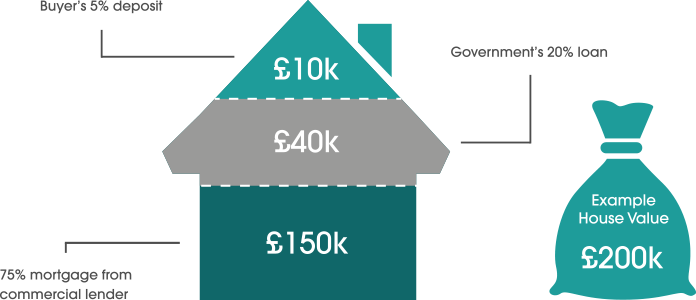Mortgage Required are approved Help to Buy Mortgage Advisers and have helped lots of clients to buy a home through this government fantastic scheme.
With a Help to Buy: Equity Loan the Government lends you up to 20% of the cost of your newly built home, so you’ll only need a 5% cash deposit and a 75% mortgage to make up the rest.
You won’t be charged loan fees on the 20% loan for the first five years of owning your home.

If the home in the example above sold for £210,000, you’d get £168,000 (80%, from your mortgage and the cash deposit) and you’d pay back £42,000 on the loan (20%). You’d need to pay off your mortgage with your share of the money.
But… what happens if property values fall?
When you sell your home, (unless you have repaid the Help to Buy equity loan document previously) the Help to Buy equity loan document commits you to repay a percentage of the market value equal to the percentage contribution of assistance received.
This means if the market value of your property falls below the level at which it was first purchased, you will repay less than the original amount the Agency contributed to the original purchase.
Here are the key features of the Help to Buy scheme:
| Amount of loan | The maximum you can borrow from Help to Buy in England is £120,000 and up to £240,000 for London. There is no minimum amount. |
| Buyer deposit required | Buyers must provide a deposit of a minimum of 5% of the full purchase price of the home bought under this scheme. |
| Maximum Purchase Price | £600,000 |
| Frequency, number and amount of repayments |
After five years you will be required to pay interest of 1.75% of the amount of your Help to Buy shared equity loan. This rises each year by the Retail Prices Index (RPI) plus 1%. The loan itself is repayable after 25 years or on the sale of the property if earlier. |
| Other payments and charges | You must pay a monthly management fee of £1 per month from the start of the loan until it is repaid. |
| Total amount repayable |
Total amount repayable The total amount repayable by you will be the proportion of the market value of your home that was funded by this loan, plus interest and charges. The amount you will have to repay under the loan agreement will depend on the market value of your home when you repay the Help to Buy equity loan and the rate of inflation in the meantime. |
To speak to one of our Help to Buy experts, please give us a call on 01628 507477.
Recent posts
Best UK Mortgage Rates this Week
2 days ago

Here are the lowest fixed mortgage rates of the week, available to first-time buyers, home movers, buy-to-let, and those remortgaging.
Call us for more information: 01628 507477 or email: team@mortgagerequired.com.

Nationwide is the first lender to allow mortgage deeds to be signed electronically and without the need for a witness.

‘My First Mortgage’ from major high-street lender Santander is specifically for those wanting to buy their first property. It allows first-time buyers to purchase 98% of the property’s value. However, certain criteria must be met to be eligible.

Maidenhead, Berkshire – 26th January 2026 – Dedicated independent mortgage experts, Mortgage Required, are delighted to have acquired fellow experienced brokerage, Y-Not Finance.
The acquisition connects two well-respected brokerages, both with a wealth of experience and shared values, to continue providing the best advice on all aspects of the mortgage market.

As part of the UK government’s plans to change the leasehold system to help families struggling with unaffordable ground rent costs.
The Prime Minister announced this morning (27 January) that ground rents will be capped at £250 per year, reverting to a peppercorn rate after 40 years.

Additional borrowing, also known as a further advance, is when you borrow more money on your existing mortgage for a specific reason agreed with your lender.
Here are five of the most common reasons for additional borrowing.
UK Housing Market Round-Up: 2025
30 Dec 2025

Property search site Zoopla has estimated that the UK housing market will end 2025 with approximately 1.15 million completed sales – 4.5% more than the previous year.
Take a look at the 2025 summary of the UK housing market.
Buying in the New Year
29 Dec 2025

If buying your first property, or moving home, is on your to-do list this year, the new year can be a great time to take this big step. In this short blog, we look at what you need to consider as you plan and prepare for your home-buying journey.



















